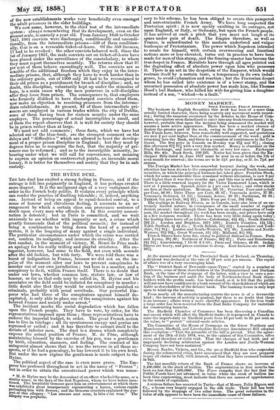THE HYIINE DUEL.
LIE late duel has excited a strong feeling in France, and if the outrage is felt less poignantly in England, it has perhaps-created more disgust. It is the malignant sign of a very malignant dis- order in the French body politic. It violates every principle which can render the practice of duelling tolerable ; if, indeed, anything can. Instead of being an appeal to equal-handed combat, to a sense of honour and chivalrous feeling, it amounts to an ar- rangement by which a certain class can pronounce sentence of death upon every man who offends it. In this country assassi- nation is detested ; but in Paris is committed, and we wait anxiously to see whether with impunity or not, a crime which greatly transcends that of the political assassin ; for instead of being a combination to bring down the head of a powerful system, it is the leaguing of many against a single individual. The particular circumstances under which the crime was carried out, confirm its malignity, and increase its atrocity. After the first combat, in the moment of victory, M. Henn de Pene made an apology for his really trifling and playful strictures. His an- tagonist, however, had come to the field not even with seconds after the old fashion, but with forty. We were told there was a burst of indignation in France, because we did not on the im- pulse of the moment alter our laws to prevent conspiracies to murder out of our own jurisdiction ; but here is a murder, and a conspiracy to do it, within France itself. There is no doubt that under our laws, whether common law, statute law, or law of honour, so far as that code may be called in, M. Hyene and his associates on the field could be indicted for conspiracy to murder ; little doubt also that they would be convicted and punished as criminals probably with penal servitude. Our powerful Em- peror who had three of the conspirators against himself de- capitated, is only able to place one of the conspirators against his beloved France and society under arrest.*
The incident marks the social degradation which has fallen upon the French people. They have to vote, by order, for the representatives imposed upon them ; those representatives have to endorse the imperial budget, to order. The great French nation has to live in tutelage ; all its spontaneous energy and genius are repressed or exiled ; and it has therefore to submit itself to the dictate of inferior men. The duel is a drama which completely exposes the actual position of France. M. de Pene, although maintaining himself by the exercise of his pen, was a gentleman by birth, education, manners, and feeling. The conduct of his antagonist almost shows that he was the reverse in all those re- spects, or if he had a genealogy, he has lowered it to his own level.
But under the new regime the gentleman is made subject to the Hyene.
The political aspect of the case is even more grave. The Em- peror has professed throughout to act in the name of " Franee" ; but in order to attain the unrestrained power which was neces-
* M. de Hyene may be the descendant of an officer who had the same, or a similar name, in the days of the first Napoleon, whom we have before men- tioned. The hospitable Genoese gave him an entertainment at which there Was exhibited a great transparency representing a hyena, various cupids garlanding him with flowers ; and the Genoese courtiers explained the pur- port of this allegory : "Lea amours sent nous, In bete c'est vous." The allegory was prophetic. sary to his scheme, he has been obliged to create this pampered and unrestrainable French Army. We have long suspected the Praetorian spirit ; it is now openly exulting in its outrages, not upon England, or Italy, or Germany, but upon the French people. It has arrived at such a pitch that you must not laugh at its spurs under pain of death. The Empire therefore, as well as France, is subordinated to this modern underbred and vulgar burlesque of Prmtorianism. The power which Napoleon intended to create for himself, with certain overweening and fanatical notions more or less elevated, turns out in practice to have been made for men of this stamp, and the fencing-master has become the true despot in France. Moralists have through all ages pointed out the degrading effect of absolute power upon him who possesses it. There 18 an art in the despotism of the Emperor, which would restrain itself by a certain taste, a temperance in its own indul- gence, to avoid exhaustion and reaction ; but the Praetorian despot whom he has called into existence is of a lower stamp, and the unearned possession of absolute power has made him, like Thomas Hood's bad Bashaw, who killed his wife for giving him a daughter instead of a son, "wicked—to a fault."


























 Previous page
Previous page